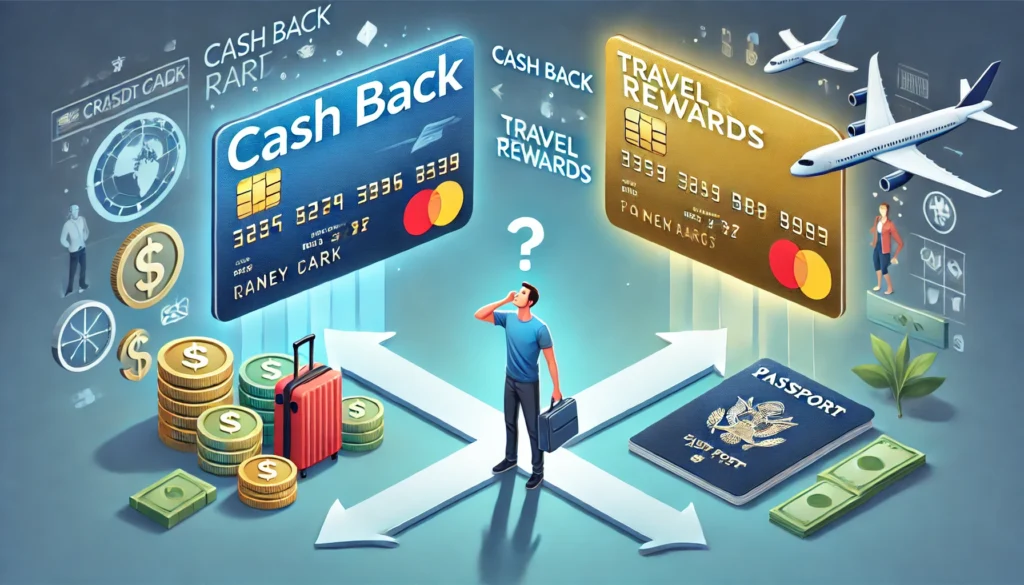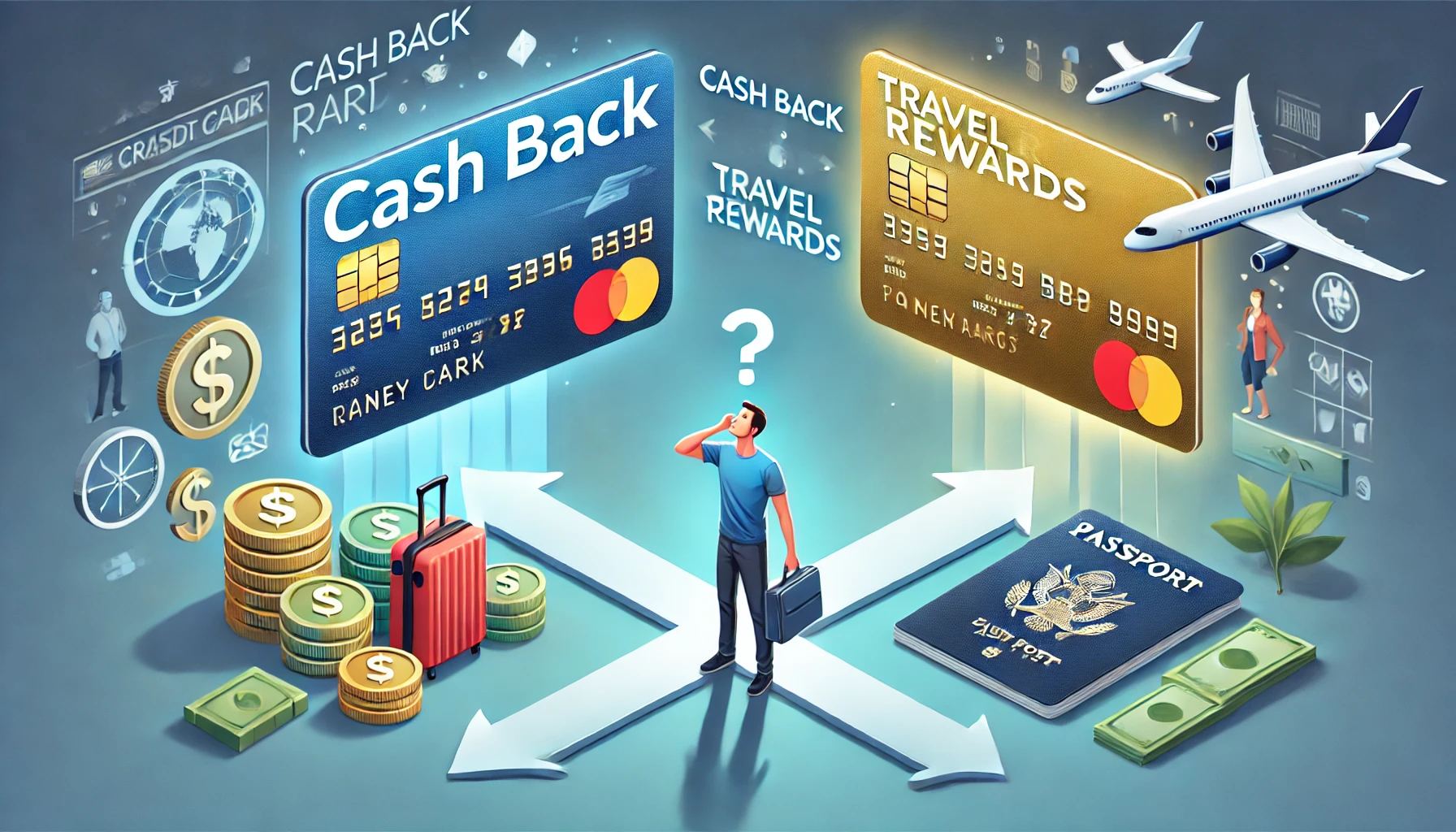
When choosing a rewards credit card, one of the most common dilemmas is deciding between cash back and travel rewards. Both types offer valuable perks, but the best choice depends on your spending habits, financial goals, and travel aspirations. This guide will break down the key differences, advantages, and drawbacks of each type to help you make an informed decision.
Understanding Cash Back Credit Cards
What Are Cash Back Credit Cards?
Cash back credit cards allow you to earn a percentage of your spending back as cash rewards. These rewards can usually be redeemed as statement credits, direct deposits, or even checks. Some cards offer flat-rate cash back on all purchases, while others provide higher rewards in specific spending categories such as groceries, dining, or gas.
Pros of Cash Back Credit Cards
- Simplicity – Cash back cards are straightforward and easy to use. There’s no need to worry about blackout dates, point conversions, or complicated redemption options.
- Flexibility – You can use cash back rewards for anything, from paying bills to making extra purchases.
- Consistent Value – Unlike travel points that may fluctuate in value, cash back maintains a predictable return on spending.
- Lower Annual Fees – Many cash back cards have no annual fees, making them a cost-effective option.
Cons of Cash Back Credit Cards
- Lower Earning Potential for Travelers – If you travel frequently, a travel rewards card may offer a higher overall value.
- Limited Bonus Categories – Some cash back cards have rotating categories that require activation, which can be a hassle.
Understanding Travel Rewards Credit Cards
What Are Travel Rewards Credit Cards?
Travel rewards credit cards allow you to earn points or miles that can be redeemed for flights, hotel stays, car rentals, and other travel-related expenses. Many of these cards are affiliated with airlines or hotel chains, offering additional perks like priority boarding, free checked bags, or complimentary hotel upgrades.
Pros of Travel Rewards Credit Cards
- Higher Reward Value for Travelers – Travel points and miles can provide more value when redeemed strategically, especially for flights and luxury hotel stays.
- Exclusive Travel Perks – Many travel cards offer benefits such as travel insurance, airport lounge access, and elite status with hotel brands.
- Sign-Up Bonuses – Travel rewards cards often feature generous sign-up bonuses that can be worth hundreds of dollars in free travel.
- Transferable Points – Some travel cards allow you to transfer points to airline and hotel partners, potentially increasing their value.
Cons of Travel Rewards Credit Cards
- Complex Redemption Process – Redeeming travel points effectively requires research and planning.
- Blackout Dates and Restrictions – Some airline and hotel programs limit availability for reward bookings.
- Annual Fees – Many premium travel rewards cards come with high annual fees, sometimes exceeding $500.
- Foreign Transaction Fees – Some lower-tier travel cards still charge foreign transaction fees, which can negate their travel benefits.
Key Factors to Consider When Choosing a Card
1. Your Spending Habits
- If you primarily spend on everyday purchases like groceries and gas, a cash back card may be more rewarding.
- If a significant portion of your spending goes toward flights, hotels, and dining out, a travel rewards card might be a better fit.
2. How Often You Travel
- If you rarely travel or prefer budget travel options, a cash back card provides more flexibility.
- If you take multiple trips per year, a travel rewards card can help you maximize savings and enjoy exclusive perks.
3. Redemption Preferences
- If you value simplicity and want rewards that can be used for anything, cash back is the way to go.
- If you enjoy the challenge of optimizing points for luxury travel, a travel rewards card offers greater potential.
4. Annual Fees
- Many cash back cards have no annual fees, making them a low-risk option.
- Travel rewards cards often have annual fees but can provide significant value if you use their benefits.
5. Sign-Up Bonuses
- Travel cards often provide massive sign-up bonuses worth hundreds of dollars in free travel.
- Some cash back cards also offer sign-up bonuses, though they tend to be lower in value.
6. Foreign Transaction Fees
- If you travel internationally, make sure your card does not charge foreign transaction fees.
- Most premium travel rewards cards waive these fees, while some cash back cards may still charge them.
Best of Both Worlds: Hybrid Strategies
If you can’t decide between cash back and travel rewards, consider using both. For example:
- Use a cash back card for everyday expenses and bills.
- Use a travel rewards card for travel-related purchases and large expenses that contribute to bonus categories.
- Take advantage of sign-up bonuses from both types to maximize rewards.
Popular Cash Back and Travel Rewards Cards
Top Cash Back Credit Cards
- Citi Double Cash Card – Earns 2% cash back on all purchases (1% when you buy, 1% when you pay).
- Chase Freedom Unlimited – Offers 1.5% cash back on all purchases, plus bonus rewards in select categories.
- Blue Cash Preferred from American Express – Provides high cash back on groceries and gas.
Top Travel Rewards Credit Cards
- Chase Sapphire Preferred® Card – A great starter travel card with valuable transfer partners.
- Capital One Venture Rewards Card – Earns 2x miles on all purchases with flexible redemption options.
- American Express Platinum Card – Premium travel perks, lounge access, and top-tier rewards.
For a deeper dive into the best rewards credit cards, check out The Points Guy and NerdWallet.
Final Thoughts
Choosing between cash back and travel rewards credit cards comes down to your lifestyle and financial goals. If you prioritize simplicity and flexibility, a cash back card is likely the best fit. If you love to travel and can take advantage of perks and redemptions, a travel rewards card can offer tremendous value.
No matter which option you choose, maximizing your rewards requires smart spending and an understanding of your card’s benefits. To learn more about the best strategies for earning and redeeming points, visit We Do Points.










